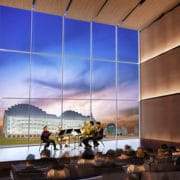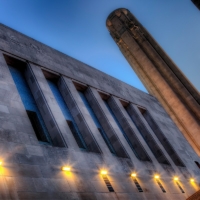Missouri Senate passes funding for Downtown Arts Campus
The UMKC Conservatory Downtown Arts Campus has cleared a major hurdle in its race for approval.
The Missouri Senate has approved HCR 19 – authorizing the issuance of public bonds for half ($48 million) of the financing of a new UMKC Conservatory Arts Campus in Downtown – by a vote of 28 to 4. The Downtown Council received word of the vote just moments after the vote from Warren Erdman, our Downtown Arts Campus champion.
This is, indeed, an “incredible victory” for Missouri, the University and for Kansas City. We share Warren’s “deep gratitude” to Senators Holsman, Silvey, Kehoe, Kraus, and many many others.
—
The Kansas City Star published this account of the day’s breaking news story on Thursday afternoon:
All that remains between the University of Missouri-Kansas City’s new downtown arts campus and the state funding needed to build it is the signature of Gov. Eric Greitens.
The Senate on Thursday passed a bill that would authorize the state to borrow $48 million through a bond issue to help fund the arts campus, which would be adjacent to the Kauffman Center for the Performing Arts.
“The asset will truly add to the cultural and economic prosperity of the city and state,” said Sen. Jason Holsman, a Kansas City Democrat who has long championed the bill.
Half of the money for the Downtown arts campus already has been raised, primarily by private donors, including $20 million from Julia Irene Kauffman, but also $7 million from Kansas City government.
“The fact that Kansas City was able to come together as a community and raise $48 million tells you how important this is,” Holsman said on the floor.
He said he’d received no indication on whether the governor would sign the bill, and Greitens’ office did not respond to a request for comment Thursday.
Still, leaders at UMKC, City Hall and throughout Downtown were jubilant.
UMKC Chancellor Leo Morton, who has been promoting a downtown arts campus since soon after he became chancellor in 2008, commended the lawmakers who pushed the measure. But he also poured praise on the business and civic leaders who got behind the effort from the onset.
“I tell you, there’s a reason why I love Kansas City and it’s the people,” Morton said. “These folks when they put their minds to it can really make things happen.”
City Manager Troy Schulte called the project “a huge step forward for the university.”
“I think it’s a transformative project for downtown, and it’ll elevate UMKC nationally and internationally,” he said.
Schulte envisions the new conservatory as “the Juilliard of the West” because it will have a symbiotic relationship with the Kauffman Center for the Performing Arts just as Juilliard has a close relationship with Lincoln Center in New York City.
City Councilwoman Jolie Justus, whose district includes Downtown, said the campus would bring a steady stream of college and graduate students to downtown, increasing the whole neighborhood’s vitality and vibrancy. She also has hopes the new conservatory can serve as a bridge to connect the Kauffman Center with the 18th &Vine Jazz District, with improvements all along 18th Street.
Warren Erdman, chief administration officer for Kansas City Southern, was among those who put special effort into getting Missouri lawmakers to support the project.
“This is one of the best shows of bipartisan leadership I’ve seen in a long time,” Erdman said. “Just an incredible show of bipartisanship. But it’s not possible without the support of the donors. If we don’t have that $48 million in our pocket, we don’t have a bill to bring forward.”
Sean O’Bryne, vice president of the Downtown Council and president of Block 4 Acquisitions, the group responsible for assembling the land where the downtown conservatory campus would be built, said the legislative action “shows that the state of Missouri is willing to invest even in tough times.”
The bill, which the House approved in March, cleared the Senate by a vote of 28-4. But vocal opponents criticized it for taking on more debt during a budget shortfall.
Sen. Bill Eigel, a Weldon Spring Republican, said funding the arts campus would plunge the state further into debt without providing substantive benefits beyond Kansas City.
And while proponents have argued that the arts campus would attract new talent and resources that would have a positive statewide impact, Eigel didn’t buy it.
“Is there a great need for dancers in the state of Missouri?” Eigel asked on the floor.
He also expressed concerns that the project would raise tuition without adding to the university’s educational value.
“What I’ve come to realize is that the amount of money going into our higher education facilities is enormous,” Eigel said. “And what we’re finding is that a lot of those funds are being spent on buildings and styles of comfort versus improving the quality of education.”
But Holsman said the project is necessary to maintain the high-caliber reputation that the UMKC arts program enjoys. He said the current facilities have serious shortcomings that must be addressed to maintain talent.
For Sen. Mike Kehoe, who carried the bill on the Senate side, state support is a smart financial move.
Because the project would be state-owned but receive partial private funding, Kehoe said the project is a fiscally responsible move for the state.
“Whenever you can get an asset on a balance sheet for half the price that it will appear on the balance sheet,” Kehoe said, “I believe it’s a good time.”
Eigel challenged that.
“I understand that this is a state asset,” he said. “I’m not sure the founding fathers imagined the government being the owners of large dance studios in spite of whatever benefit of fiscal incentive we think there is.”
Holsman emphasized the teamwork required to pass the legislation. He said partnerships with business leaders and among members of the Kansas City delegation helped move the bill over the finish line.
Sen. Ryan Silvey, a Kansas City Republican, was part of that partnership.
“I think it’s going to be a great addition to downtown,” Silvey said. “It’s going to create wonderful synergy between the performing arts and the education facilities that we already have.”
For Holsman and Silvey, the passing of the bill marks a major milestone.
“We are ecstatic that Kansas City has the opportunity to have a world-class facility as this to add to our continued momentum,” Holsman said. “This could end up being a signature piece of legislation for the session.”


